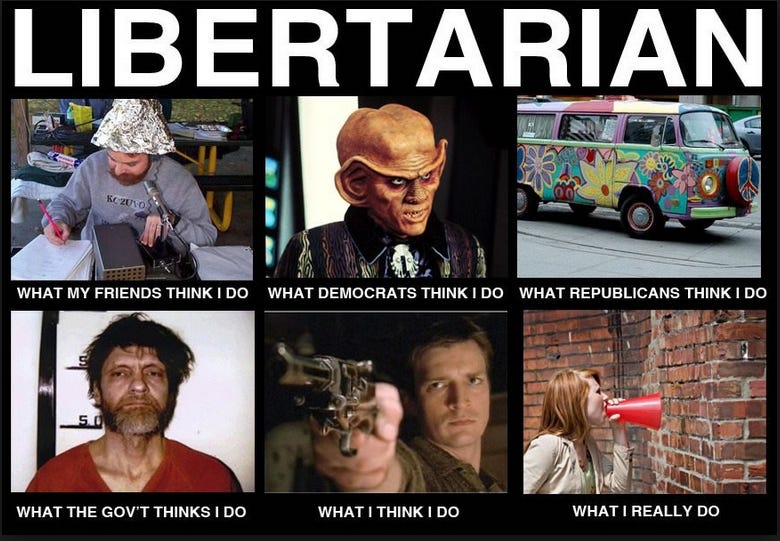Your liberty

While I may be quite clear on my own stand about liberty, I can get a little confused when I see others making claims about theirs. When I first started exploring the questions of my, your and our liberty, I came across this list of “Schools of Libertarian thought”.
Agorism – Anarcho-capitalism – Austrian School – Autarchism – Christian libertarianism – Civil societarianism – Classical liberalism – Consequentialist libertarianism – Crypto-anarchism – Deontological libertarianism – Free-market anarchism Geolibertarianism – Green libertarianism – Individualist anarchism – Individualist feminism – Left-libertarianism – Liberism – Libertarian Christianity – Libertarian conservatism – Libertarian socialism – Libertarian municipalism – Market liberalism – Market socialism – Minarchism – Mutualism – Paleoliberalism – Paleolibertarianism – Panarchism – Philosophical anarchism – Propertarianism – Right-libertarianism – Right-wing anarchism – Voluntaryism –
It is a confusing array with many overlaps and just as many contradictions. I am also amazed by the array of libertarian positions manifested in social media. I often have to wonder what holds us together and what may tear us apart. My own personal path to the ideas of liberty seem fairly straightforward to me. Your path was most likely different, but it would be important for all of us to be clear what we expect from our believes. What makes the political left so successful is their ability to forge alliances, their readiness to find common ground with any group moving in the same general direction. Libertarians can only become a political force if they can find common ground, points and attitudes they can all agree on. This has to start with the kind of self-examination I did in my previous post. You also should ask yourself:
What does liberty mean to you?
Personal freedom? Opposition to established powers? The right to smoke dope, or liberating the economy from the burdens of government? What is the most important element you see in liberty? Reason – meaning that it makes sense, that it is a most coherent political philosophy, or Morality – meaning the appeal to your sense of justice as the most equitable political philosophy or Indignation and disgust about the system we are living in? Which of these three elements drive you most? My question is not what particular believes you hold about liberty, but what motivates you toward a political philosophy that is so much at odds with the political realities around us. What is more important to you? The idea or the practice? Ideological consistency or practical results? If you had a choice to eliminate a tax or a regulation, which one would you choose? The one that offends your sense of individual freedom the most or the one that is the most harmful to the economy or to society? How comfortable are you with making compromises? Are you ready to stand up to defend a compromise, to say (for example) that you are willing to live with tax ‘X’ because it is less harmful than regulation ‘Y’? Some in the movement say that participation in the system is a corruptive compromise. Can you see yourself as an MP or MPP? Do you see the possibility of libertarians initiating meaningful change in politics or are you just trying to popularize the idea? The conservative party of Canada has a strong libertarian wing (much maligned by Harper). Let’s suppose that the next party leader would be a member of that libertarian caucus. Would that make you start voting Conservative?
Libertarian inconsistency
The most interesting fact of the variety of libertarian ideas is how easily they can flow from one extreme to the other, from Anarcho-capitalism to libertarian socialism, all within the framework of what each understands as “libertarianism.” Any ideology that can mention Murray Rothbard and Noam Chomsky on the same page have some issues to sort out. Noam Chomsky, the sleaziest apologist of the bloodiest communist dictatorships not only calls and considers himself a libertarian, he argues (in this speech among many others) that his form of libertarianism is the ‘real’ libertarianism and what you or I may consider libertarian is just an American aberration of the noble ideals of socialism. “Libertarian in Europe always meant socialist.” Chomsky’s claims non-withstanding, libertarianism is more likely to mean what the rest of us mean by it, but this rest of us is still a really wide (and wild) field with far more bickering than sense of common purpose. I find the direction of the Libertarian Party of Canada very encouraging. It seems to me that we are moving in the direction to become a respectable party. What that should mean will be the subject of my next post. In the meantime, if you have not seen it yet, look at this collection below. It is a pretty good summary of how we are perceived by our political adversaries. It may worth a much closer look.

The left's perception of libertarians



